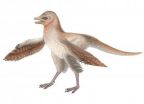(Press-News.org) PITTSBURGH, Jan. 24, 2013 – Researchers at the University of Pittsburgh School of Medicine may have found an "Achilles heel" in a key HIV protein. In findings published online today in Chemistry and Biology, they showed that targeting this vulnerable spot could stop the virus from replicating, potentially thwarting HIV infection from progressing to full-blown AIDS.
Previous research demonstrated that a small HIV protein called Nef interacts with many other proteins in infected cells to help the virus multiply and hide from the immune system. The Pitt group developed a way to track Nef activity in high-throughput drug screening protocols by linking it to an enzyme called Hck, which is activated by Nef in HIV-infected cells, explained senior author Thomas E. Smithgall, Ph.D., William S. McEllroy Professor and Chair, Department of Microbiology and Molecular Genetics.
"We reasoned that agents that prevent Nef from its usual interactions with other proteins might be able to stop HIV from replicating and infecting other cells," Dr. Smithgall said. "For this study, we devised an automated screening procedure and tested nearly 250,000 compounds to find ones that could block Nef activity."
One of the compounds they discovered, called B9, seemed particularly potent at blocking Nef. In follow-up experiments, the research team examined how B9 accomplished this and found that it could prevent two Nef molecules from interacting to form dimers as effectively as a mutation in a critical area of the protein surface. The inability of Nef to dimerize consequently impairs its function in the viral replication process.
"This pocket where B9 binds to Nef and where Nef forms a dimer indicates it's a hot spot, or Achilles heel, that could represent a new target for HIV drugs," Dr. Smithgall said. "Our test tube and cell culture experiments show that blocking this site brings HIV replication to a halt."
The team is working with medicinal chemists at the University of Pittsburgh Drug Discovery Institute (DDI) to find analogs of B9 that have therapeutic potential, and plan to assess them in animal models of HIV/AIDS.
### Co-authors of the study include lead investigator Lori Emert-Sedlak, Ph.D., Purushottam Narute, Ph.D., Sherry Shu, Ph.D., and Jerrod A. Poe, Ph.D., all of the Department of Microbiology and Molecular Genetics, Pitt School of Medicine; Haibin Shi, Ph.D., Naveena Yanamala, Ph.D., John Jeff Alvarado, Ph.D., and Joanne Yeh, Ph.D., all of the Department of Structural Biology, Pitt School of Medicine; Paul Johnston, Ph.D., of DDI and the Department of Pharmaceutical Sciences, Pitt School of Pharmacy; and John Lazo, Ph.D., now of the University of Virginia.
The project was funded by National Institutes of Health grants R01 AI057083, R21 AI077444, and X01 MH083223.
About the University of Pittsburgh School of Medicine
As one of the nation's leading academic centers for biomedical research, the University of Pittsburgh School of Medicine integrates advanced technology with basic science across a broad range of disciplines in a continuous quest to harness the power of new knowledge and improve the human condition. Driven mainly by the School of Medicine and its affiliates, Pitt has ranked among the top 10 recipients of funding from the National Institutes of Health since 1998. In rankings recently released by the National Science Foundation, Pitt ranked fifth among all American universities in total federal science and engineering research and development support.
Likewise, the School of Medicine is equally committed to advancing the quality and strength of its medical and graduate education programs, for which it is recognized as an innovative leader, and to training highly skilled, compassionate clinicians and creative scientists well-equipped to engage in world-class research. The School of Medicine is the academic partner of UPMC, which has collaborated with the University to raise the standard of medical excellence in Pittsburgh and to position health care as a driving force behind the region's economy. For more information about the School of Medicine, see www.medschool.pitt.edu.
http://www.upmc.com/media
Pitt team finds 'Achilles Heel' of key HIV replication protein
2013-01-24
ELSE PRESS RELEASES FROM THIS DATE:
The impact of affirmative action bans in graduate fields of study
2013-01-24
WASHINGTON, January 23, 2013─Important findings on the impact of banning affirmative action in higher education were just published in the American Educational Research Journal (AERJ) in Online First. Affirmative action in university admissions has long been a matter of public debate, and Fisher v. University of Texas, Austin has placed its use in admissions policy as an issue before the U.S. Supreme Court. AERJ is a top-ranked peer-reviewed journal of the American Educational Research Association.
The article, "Understanding the Impact of Affirmative Action Bans ...
Temple scientists find cancer-causing virus in the brain, potential connection to epilepsy
2013-01-24
(Philadelphia, PA) - Researchers at Shriner's Hospital Pediatric Research Center at the Temple University School of Medicine, and the University of Pennsylvania have evidence linking the human papillomavirus 16 (HPV16) – the most common cause of cervical cancer – to a common form of childhood epilepsy. They have shown for the first time that HPV16 may be present in the human brain, and found that when they added a viral protein to the brains of fetal mice, the mice all demonstrated the same developmental problems in the cerebral cortex associated with this type of epilepsy, ...
Don't ignore the snore: Snoring may be early sign of future health risks
2013-01-24
DETROIT – Here's a wake-up call for snorers: Snoring may put you at a greater risk than those who are overweight, smoke or have high cholesterol to have thickening or abnormalities in the carotid artery, according to researchers at Henry Ford Hospital in Detroit.
The increased thickening in the lining of the two large blood vessels that supply the brain with oxygenated blood is a precursor to atherosclerosis, a hardening of the arteries responsible for many vascular diseases.
"Snoring is more than a bedtime annoyance and it shouldn't be ignored. Patients need to seek ...
Can you 'train' yourself to have more willpower?
2013-01-24
PROVIDENCE, R.I. – You can train your body, your mind … and your willpower? That's according to a new study by researchers at The Miriam Hospital's Weight Control and Diabetes Research Center, who say that with a little practice, it may be possible to strengthen and improve your self-control – and lose more weight.
The Miriam research team found that individuals with more willpower – or self-control – lost more weight, were more physically active, consumed fewer calories from fat and had better attendance at weight loss group meetings. The same was true for participants ...
Grammar undercuts security of long computer passwords
2013-01-24
PITTSBURGH—When writing or speaking, good grammar helps people make themselves be understood. But when used to concoct a long computer password, grammar — good or bad — provides crucial hints that can help someone crack that password, researchers at Carnegie Mellon University have demonstrated.
A team led by Ashwini Rao, a software engineering Ph.D. student in the Institute for Software Research, developed a password-cracking algorithm that took into account grammar and tested it against 1,434 passwords containing 16 or more characters. The grammar-aware cracker surpassed ...
Neuroinflammation may be behind general-anesthesia-associated learning disabilities
2013-01-24
Several studies have found evidence that children who undergo repeated surgical operations with general anesthesia before the age of 4 may be at an increased risk for learning disabilities. In the March issue of Anesthesiology, Massachusetts General Hospital (MGH) researchers report an animal study indicating that several factors – age, the specific anesthetic agent used and the number of doses – combine to induce impairments in learning and memory accompanied by the inflammation of brain tissue. An accompanying paper from the same team finds that the offspring of mice ...
Urban metabolism for the urban century
2013-01-24
New Haven, Conn.–Like organisms, cities need energy, water, and nutrients, and they need to dispose of wastes and byproducts in ways that are viable and sustainable over the long run. This notion of "urban metabolism" is a model for looking systematically at the resources that flow into cities and the wastes and emissions that flow out from them—to understand the environmental impacts of cities and to highlight opportunities for efficiencies, improvements, and transformation.
Yale University's Journal of Industrial Ecology is pleased to announce a special issue on Sustainable ...
New dinosaur fossil challenges bird evolution theory
2013-01-24
The discovery of a new bird-like dinosaur from the Jurassic period challenges widely accepted theories on the origin of flight.
Co-authored by Dr Gareth Dyke, Senior Lecturer in Vertebrate Palaeontology at the University of Southampton, the paper describes a new feathered dinosaur about 30 cm in length which pre-dates bird-like dinosaurs that birds were long thought to have evolved from.
Over many years, it has become accepted among palaeontologists that birds evolved from a group of dinosaurs called theropods from the Early Cretaceous period of Earth's history, around ...
Sun shoots out 2 coronal mass ejections
2013-01-24
VIDEO:
This movie shows two coronal mass ejections (CMEs) erupting from the sun on Jan. 23, 2013. The first was not directed at Earth; the second one is, but is not...
Click here for more information.
On Jan. 23, 2013, at 9:55 a.m. EST, the sun erupted with an Earth-directed coronal mass ejection, or CME. Experimental NASA research models, based on observations from the Solar Terrestrial Relations Observatory (STEREO) and ESA/NASA's Solar and Heliospheric Observatory, show ...
Valuing nature is not enough
2013-01-24
Is it possible to put a price tag on the natural world? A researcher at The University of Nottingham has been examining the rise of a new concept — ecosystem services — to describe the multitude of resources supplied to us by Mother Nature.
Academic Dr Marion Potschin, of the University's Centre for Environmental Management, is among an international team of researchers who have been investigating the ethical considerations of this new concept, which some have argued turns nature into a 'commodity'.
In a paper published in the journal BioScience, Dr Potschin and her ...

